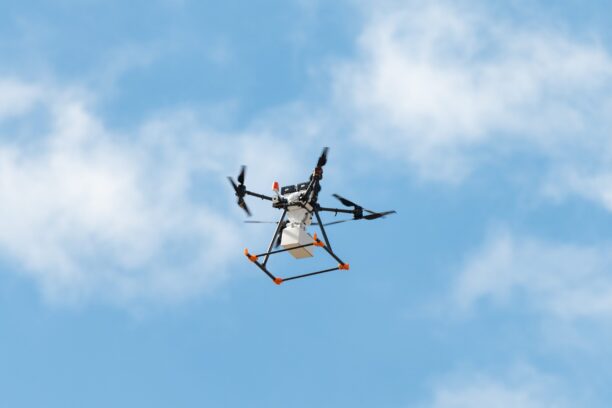


Elsight, an ASX-listed company, is collaborating with DroneUp in a significant commercial drone delivery trial in the Dallas-Fort Worth region of the United States. This trial, closely monitored by the United States Federal Aviation Administration (FAA), has the potential to reshape the landscape of drone deliveries by easing current regulatory restrictions.
Testing Drone Deliveries at Scale
The trial involves three competing drone parcel delivery providers, including DroneUp, all operating in the same crowded airspace. This scenario aims to test how drone deliveries can be managed at scale. The trial is part of Walmart’s delivery system and is expected to play a crucial role in determining the future of commercial drone operations.
Elsight supplies the Halo communications system to DroneUp, which enables drones to fly Beyond the Visual Line of Sight (BVLOS). This technology allows a single operator to control multiple drones from a remote location. According to Elsight Chief Executive Officer Yoav Amitai, “At the conclusion of the FAA monitored trial, and based on the lessons learned, it is expected that the FAA will give greater freedom to operate to this industry with a positive impact to both Walmart and DroneUp, paving the way for a more efficient and profitable delivery operation.”
The Push for Scalable and Cost-Effective Models
DroneUp is focusing on creating a scalable drone delivery model that will significantly reduce delivery costs. Currently, the cost to deliver a package via drone is around $30, but the goal is to reduce this to less than $7. The Dallas-Fort Worth trial is a step toward achieving this objective, with DroneUp competing against Alphabet’s Wing and Zipline.
DroneUp has recently reported impressive milestones, including achieving 500 deliveries a day and up to 40 deliveries per hour with an improved pilot-to-drone ratio. This progress highlights the potential for drone deliveries to become a mainstream service.
John Vernon, DroneUp’s Chief Technology Officer, emphasized the importance of reliable technology in achieving these results. He stated, “Elsight provided the reliability that we needed, provided the connection consistency, provided the bandwidth. Elsight had the cloud, provisioning, management, and software capabilities that allowed us to continue refining and improving something Elsight still does very well.”
Growing Consumer Acceptance
As drone technology advances, consumer acceptance of drone deliveries is on the rise. A recent survey conducted by DroneUp revealed that customer satisfaction with drone delivery services is overwhelmingly positive. Over 90% of respondents were satisfied with aspects such as safety, speed of delivery, messaging updates, and delivery location. Notably, 96% of customers expressed confidence in the safety of the service.
This growing acceptance is not limited to the United States. In Australia, drone delivery services are also expanding. For instance, DoorDash, in partnership with Alphabet’s Wing, has begun offering food delivery services within a seven-kilometer radius of the Eastland shopping center in Melbourne’s eastern suburbs. This service is expected to reach up to 250,000 potential customers across 26 suburbs.
The Future of Drone Deliveries
The potential relaxation of FAA restrictions could have a ripple effect, leading to similar regulatory changes in other countries, including Australia. A report by Airservices Australia projects that drone deliveries could account for 70% of all drone flights by 2043. This expansion will require a significant increase in drone flight capacity, which Elsight’s Halo system aims to support.
Amitai emphasized the importance of reliable connectivity for the future of drone deliveries, particularly for BVLOS flights. “Complete connection confidence is a necessary component in flying beyond the visual line of sight for the navigation and safety of unmanned vehicles,” he said. The Halo system has already demonstrated its reliability in over 250,000 flight hours globally, ensuring safe and consistent operations.
As the Dallas-Fort Worth trial progresses, it may well set the stage for a new era in drone delivery services, offering faster, more cost-effective, and scalable solutions for consumers and businesses alike.
Read more:
Miriam McNabb is the Editor-in-Chief of DRONELIFE and CEO of JobForDrones, a professional drone services marketplace, and a fascinated observer of the emerging drone industry and the regulatory environment for drones. Miriam has penned over 3,000 articles focused on the commercial drone space and is an international speaker and recognized figure in the industry. Miriam has a degree from the University of Chicago and over 20 years of experience in high tech sales and marketing for new technologies.
For drone industry consulting or writing, Email Miriam.
TWITTER:@spaldingbarker
Subscribe to DroneLife here.